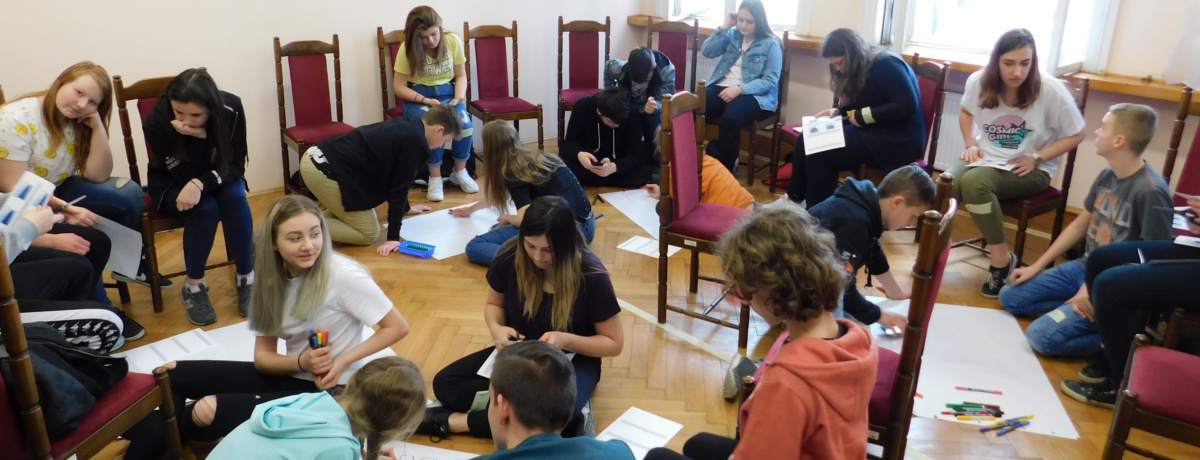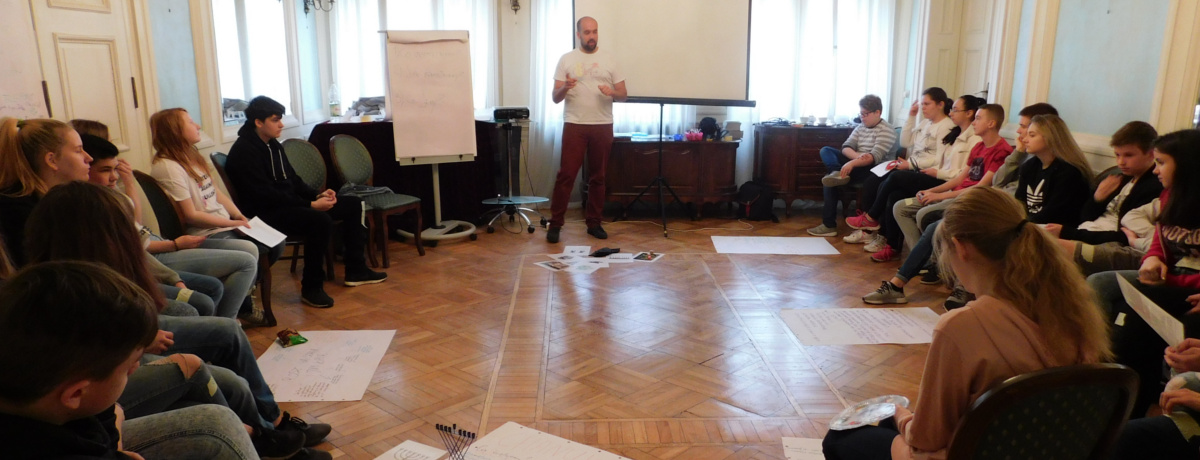| 2018 |
Czeladź
Polish Educational Society Elementary School No. 5


| 2018 |
Sometimes School of Dialogue workshops are held in a location that does not offer many sites related to Jewish presence. This was the case in Czeladź, where Jewish settlement was forbidden already in the 13th century. Jews would therefore settle in nearby Będzin, which has much more to offer in terms of Jewish material heritage. Nevertheless, exploring local history, finding material remnants as well as identifying immaterial heritage, to share with current town residents has proven to be rewarding. “De non tolerandis Judaeis” privilege was enforced up until late 18th century, when Poland was partitioned and the town fell under Prussian rule. However, the new authorities allowed Jewish merchants to conduct trade in Czeladź and thus an organic opportunity for mutual contacts was created.
According to the legend, the Szwajgier family was the first to settle in Czeladź and soon others followed. In the second half of the 19th century, Jewish settlement in the town flourished and in early 20th century, a group of Jewish craftsmen, shopkeepers and salesmen arrived from Wolbrom, Żarki, Częstochowa, Olkusz and Będzin. In 1905, the local rabbi and community successfully had to a prayer hall (bet ha-tefila) constructed in Czeladź. Although Jews comprised a small minority of the local population, Maccabee sports club, a Jewish bank and a number of charities flourished. These were happy times; there was no foreboding of what was to come.

Middle school students from Elementary School No.5 in Czeladź searched for information in all sources they could find, discovering parts of local history they had previously no idea about and thus gaining a better understanding of the traces in their town’s topography: a forlorn cemetery, crumbs of memory. In the course of the workshops, they learned a lot about Jewish culture, traditions, annual and family holidays. Equipped with this information, they decided to design an urban game “Jewish Trail in Zaglembie region”. Tour participants – among them fellow students from other years and schools as well as senior citizens – contacted the organizers for to participate in a walk through Czeladź, complete tasks connected to Jewish culture and local history, and see well-known sites such as the well, market square, obelisk commemorating the synagogue and the Monument to the Victims of the Holocaust in a different light: as a puzzle everyone joining the tour was invited to solve. Students insisted that the Jewish cemetery figure on their final tour itinerary despite their teachers’ doubts if its location away from the town’s center is not too remote.
Ultimately, they conceded and finally, albeit for a short period of the game’s duration, the Jewish cemetery became a destination for local residents; they became aware of its existence and its site sparked curiosity and led to questions like “Who were the people that had built this town before us?” One school student found the Jewish cemetery visit, a first for him, especially memorable, while a female participant added that she is happy to have had the opportunity to visit the site instead of just peeping through the gate.
This is exactly the mission of School of Dialogue – to make familiar that which seems foreign, to awaken curiosity and to sensitize to the non-obvious elements in the obvious space of a town students think they know like the back of their hand. Equipped with rudimentary knowledge, project participants form Czeladź are already capable of sharing it with other residents.

School: Polish Educational Society Elementary School No. 5
Students: 2nd year students
Educators: Katarzyna Czubińska, Stanisław Niemojewski
School of Dialogue program in Czeladź was made possible by the support from AMTRA LTD.
In appreciation to the Conference on Jewish Material Claims Against Germany (Claims Conference) for supporting this educational program. Through recovering the assets of the victims of the Holocaust, the Claims Conference enables organizations around the world to provide education about the Shoah and to preserve the memory of those who perished.